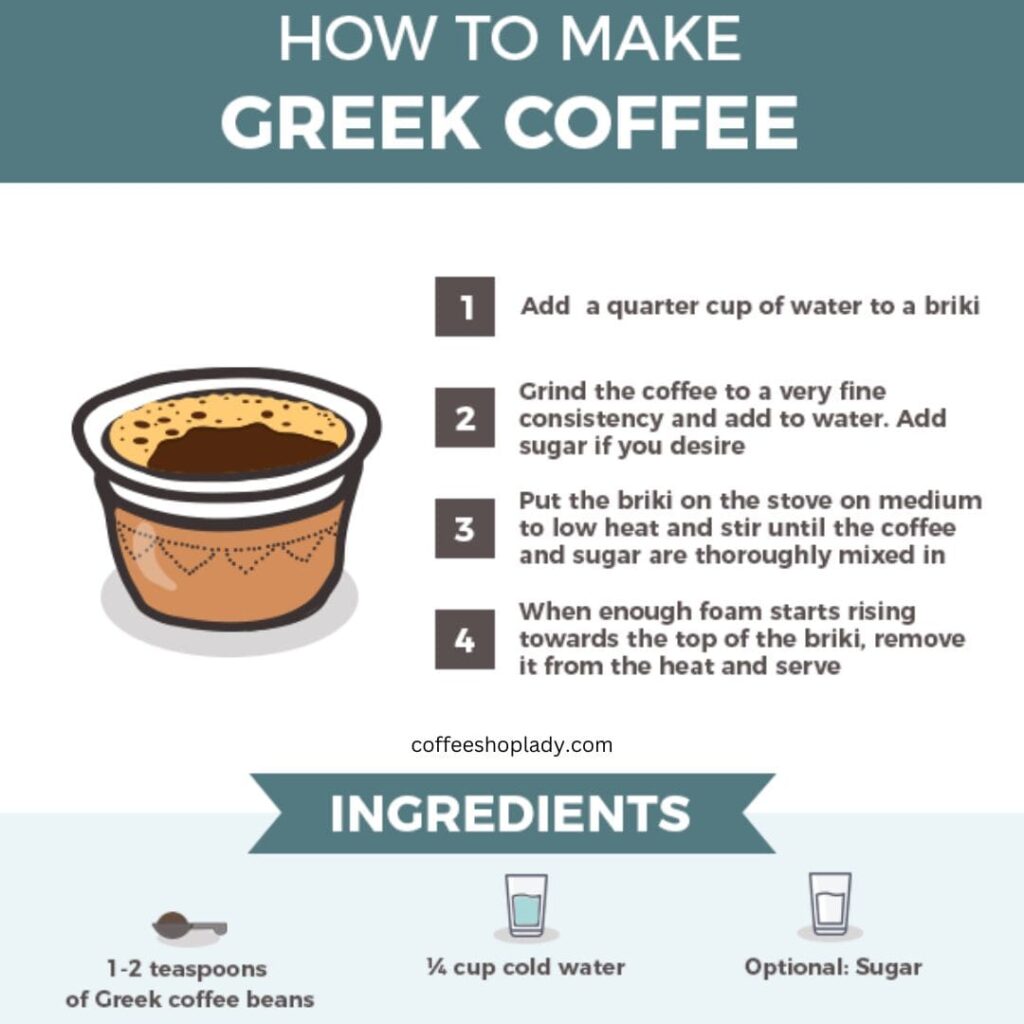Written By: Sherry Harris
Greek coffee is a unique and cherished beverage, known for its rich flavor, thick texture, and cultural significance. Unlike regular coffee, it is brewed unfiltered, giving it a distinct taste and character. This traditional drink has been passed down through generations and remains a symbol of hospitality and connection in Greek households.
Table of Contents
How to Make Greek Coffee?
What is Greek Coffee?
Greek coffee is a traditional, unfiltered coffee made by slowly brewing finely ground coffee in a briki, a small pot. The result is a strong, bold brew served in small cups, often with a layer of thick foam on top. This foam, called kaimaki, is considered the hallmark of a well-made Greek coffee.
Unlike espresso or filtered coffee, Greek coffee retains its sediment at the bottom of the cup. This unfiltered nature not only adds to its rich taste but also sets it apart from other brewing methods. It’s deeply rooted in Greek culture and is often enjoyed in relaxed, social settings.
How Much Caffeine in Greek Coffee?
Greek coffee contains a moderate amount of caffeine, making it a suitable choice for those seeking a balance between energy and flavor. On average, an 8-ounce serving of Greek coffee has about 40-60 milligrams of caffeine, depending on the type of beans and the brewing process. This amount is less than espresso but slightly more than most instant coffees.
The unfiltered brewing method ensures a full-bodied flavor while delivering a slow release of caffeine. This gradual energy boost is ideal for maintaining focus without causing the jitters that some high-caffeine drinks might trigger.
Key Ingredients of Greek Coffee
- Finely Ground Coffee: The foundation of Greek coffee is its ultra-fine grind, which resembles powdered sugar. This consistency ensures the coffee blends seamlessly in water and enhances its rich, robust flavor.
- Cold Water: Starting with cold water is essential to control the brewing process and allow the flavors to develop gradually. Precise measurements of water are crucial for a balanced brew.
- Sugar (Optional): Sugar is added directly into the briki during brewing. Depending on personal preference, you can enjoy your coffee sketos (no sugar), metrios (medium sweetness), or glykos (very sweet).
- Briki (Coffee Pot): This small pot with a long handle is specifically designed for making Greek coffee, ensuring even heat distribution for the perfect kaimaki (foam).

How to Make Greek Coffee?
How to Make Greek Coffee?
Making Greek coffee is a meticulous yet simple process that requires patience and precision. Follow this step-by-step guide for an authentic brew:
- Measure Ingredients: Add one heaping teaspoon of finely ground coffee per cup and sugar (if desired) into the briki.
- Add Cold Water: Pour the appropriate amount of cold water into the briki, usually about 2 ounces per serving.
- Stir the Mixture: Gently stir the coffee, sugar, and water until fully dissolved, but do not stir again after heating begins.
- Heat Slowly: Place the briki over low heat to allow the coffee to warm up gradually. Avoid rushing, as this ensures the flavors develop fully.
- Watch for Foam: As the coffee heats, foam (kaimaki) forms at the surface. Once the foam reaches the brim, remove the briki from the heat to prevent boiling.
- Pour Carefully: Pour the coffee into small demitasse cups, dividing the foam evenly. Serve immediately without stirring to preserve the layers.
Alternatives of Greek Coffee
If you’re exploring options beyond Greek coffee, several beverages offer unique flavors and varying caffeine levels. Here are five alternatives to consider: How to Make Greek Coffee?
Turkish Coffee
Turkish coffee is similar to Greek coffee in its unfiltered preparation and robust taste. Brewed in a cezve, it often includes spices like cardamom, which add a warm and aromatic touch. The caffeine content is similar to Greek coffee, with around 40-60 mg per serving, making it a close alternative for those who appreciate strong, traditional coffee.
Espresso
For those who prefer a concentrated coffee shot, espresso is an excellent choice. It delivers a bold, intense flavor and a quick energy boost with approximately 63 mg of caffeine per ounce. Espresso is ideal for busy mornings or as a base for popular beverages like cappuccinos and lattes.
French Press
French press coffee is brewed by steeping coarser coffee grounds in hot water and then pressing the grounds out. This method produces a smooth and full-bodied flavor, although it lacks the foam characteristic of Greek coffee. It contains about 80-100 mg of caffeine per 8-ounce serving, making it a slightly stronger option.
Instant Coffee
For convenience, instant coffee is a quick and easy alternative to Greek coffee. While its flavor is milder and less complex, it provides a caffeine range of 30-90 mg per serving, depending on the brand and preparation. It’s a go-to choice for those seeking speed and simplicity without a dedicated brewing process.
Arabian Coffee
Arabian coffee, or Qahwa, offers a lighter and more fragrant alternative, often spiced with cardamom, saffron, or rosewater. Its preparation emphasizes subtle flavors over bold intensity, and it typically contains about 30-50 mg of caffeine per serving. Qahwa pairs wonderfully with dates or other sweets for a balanced and cultural experience.
| Alternative | Caffeine Content (Per Serving) |
|---|---|
| Turkish Coffee | 40-60 mg |
| Espresso | 63 mg (per ounce) |
| French Press Coffee | 80-100 mg (per 8 ounces) |
| Instant Coffee | 30-90 mg |
| Arabian Coffee (Qahwa) | 30-50 mg |
Do You Know?
👉 How to Make Iced Matcha Latte?
Health Impact of Greek Coffee
Rich in Antioxidants
Greek coffee is packed with antioxidants that combat free radicals in the body. These compounds help reduce oxidative stress, supporting heart health and protecting against chronic diseases.
Improves Heart Health
Studies suggest that regular consumption of Greek coffee may lower the risk of heart disease. Its unfiltered nature retains beneficial compounds like chlorogenic acids, which contribute to cardiovascular health.
Supports Longevity
In regions like Ikaria, where people consume Greek coffee daily, longevity rates are among the highest in the world. This is attributed to the drink’s high concentration of polyphenols and antioxidants, promoting overall well-being.
Daily Intake of Greek Coffee
To enjoy the benefits of Greek coffee without overdoing its caffeine content, moderation is key. Experts recommend consuming one to two small cups per day, which provides a sufficient energy boost and health benefits. Overindulging might lead to issues like jitteriness or disrupted sleep patterns due to the caffeine.
Drinking Greek coffee in appropriate amounts ensures you reap its antioxidants and cardiovascular advantages. Pairing it with a healthy Mediterranean diet can amplify its positive effects on health and longevity.
Conclusion
Greek coffee is more than just a drink; it’s a cultural treasure that combines rich flavor, health benefits, and social connection. Its unique unfiltered brewing method and moderate caffeine content make it a standout choice for coffee lovers. Whether enjoyed in the morning or during a leisurely afternoon, it brings a sense of warmth and tradition to every sip.
By understanding how to brew and consume Greek coffee properly, you can embrace this timeless ritual and make it a part of your daily routine. It’s not just about the beverage itself but also the moments and memories it creates, connecting people across generations.
Frequently Asked Question
Q. Can I drink Greek coffee every day?
Yes, drinking Greek coffee daily is generally safe when consumed in moderation. Experts recommend limiting intake to one or two small cups per day to enjoy its health benefits without overconsuming caffeine. Regular consumption has even been linked to improved heart health and longevity in studies of Mediterranean diets.
Q. Is Greek coffee healthier than regular coffee?
Greek coffee is often considered healthier due to its unfiltered brewing process, which retains more antioxidants like chlorogenic acids. These compounds are known for promoting heart health and reducing oxidative stress. Additionally, Greek coffee’s moderate caffeine content makes it less likely to cause jitters compared to stronger brews like espresso.
Q. What makes Greek coffee different from espresso?
While both are bold and flavorful, Greek coffee is unfiltered and brewed slowly, resulting in a thicker texture and sediment at the bottom of the cup. Espresso, on the other hand, is a pressurized brew with no sediment and a more concentrated flavor. Greek coffee is traditionally enjoyed leisurely, whereas espresso is often consumed quickly for an instant energy boost.
Q. Does Greek coffee have more caffeine than regular coffee?
No, Greek coffee typically has less caffeine than regular drip coffee or espresso. On average, a small serving of Greek coffee contains 40-60 mg of caffeine, compared to an 8-ounce cup of drip coffee, which has 80-100 mg. Its moderate caffeine content makes it a balanced choice for sustained energy without overstimulation.
Q. What is the proper way to drink Greek coffee?
To fully enjoy Greek coffee, it’s essential to sip it slowly without stirring after it’s served. The unfiltered nature means sediment settles at the bottom, which should not be consumed. Pair it with a small glass of water or a sweet treat, as is customary in Greek culture, to enhance the experience.

